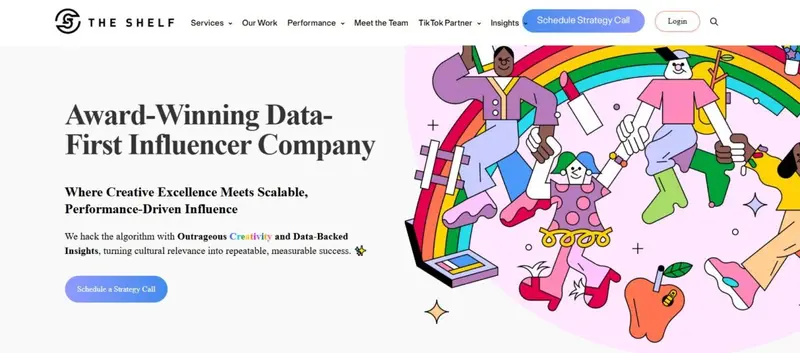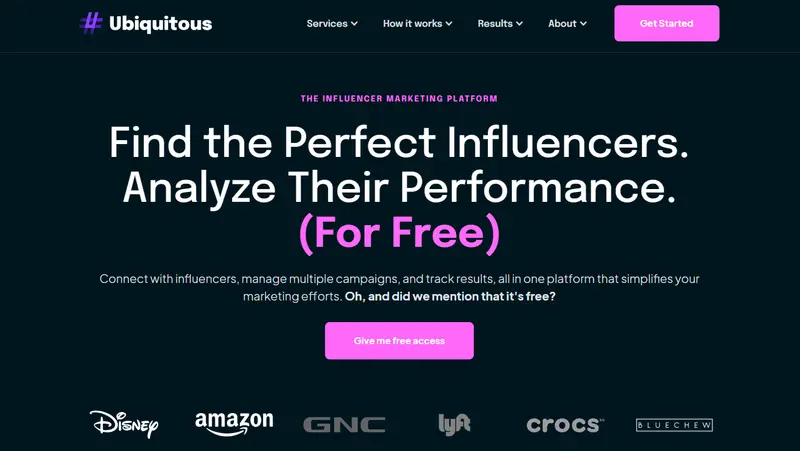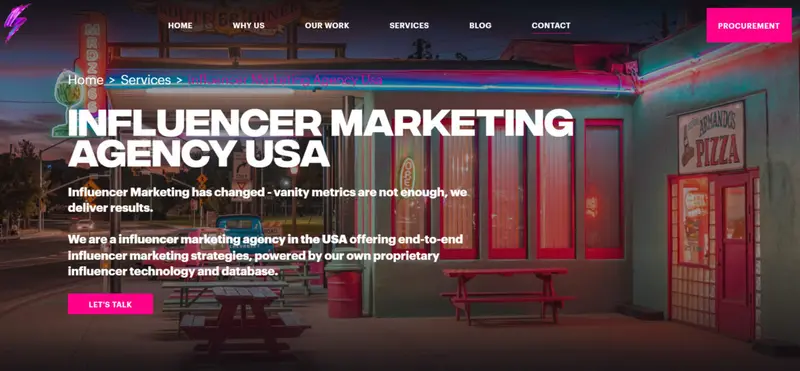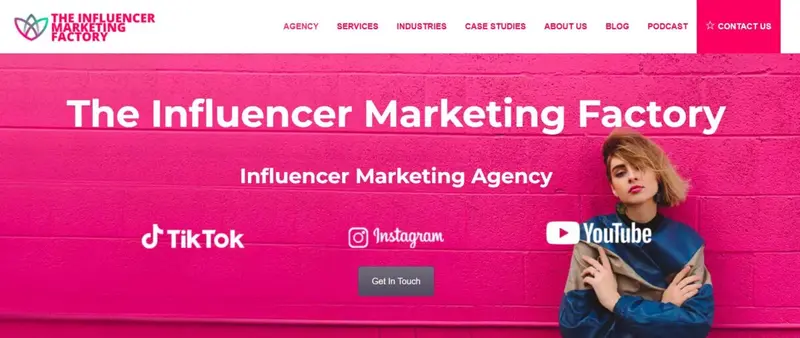Influencer Marketing Hub sets itself apart from conventional review platforms through the involvement of Influencer Marketing experts such as Werner Geyser, Djanan Kasumovic, Camille Kennedy, Dave Eagle, and other notable industry figures. This expert team brings a profound understanding of the Influencer Marketing landscape, assessing tools and platforms with an insider’s perspective on capabilities, experience, and industry acumen. Unlike user-generated review platforms, Influencer Marketing Hub’s evaluations are rooted in extensive firsthand experience and direct interactions with the tools and platforms in question. This ensures that the reviews are not only trustworthy but also deeply informed. High-caliber brands like The Shelf, Ubiquitous, and Carusele undergo rigorous monthly evaluations, highlighting the platform’s commitment to identifying and showcasing top-tier solutions in Influencer Marketing and beyond.
Influencer Marketing Hub has consistently been recognized by leading media outlets for our authoritative data, findings, and insights within the Influencer Marketing landscape. Our platform is frequently cited as a trusted source of information, demonstrating the value and impact of our work in shaping industry standards and practices.
Influencer Marketing Hub employs an expert-driven methodology to evaluate Influencer Marketing agencies, ensuring that our recommendations are both reliable and comprehensive. This approach is designed to help businesses and individuals find the best agencies to meet their specific Influencer Marketing needs. Here’s how we assess the various agencies like The Shelf, Ubiquitous, and Carusele:
Hiring a “brand awareness” influencer agency isn’t about running a few creator posts—it’s about removing blockers that keep CMOs from funding top-of-funnel work.
First, leadership won’t accept raw impressions; they want proof of lift (ad recall, awareness, consideration) from proper Brand Lift frameworks or randomized tests, not vanity dashboards.
Second, budgets leak through duplicated reach and unmanaged frequency across platforms; you need deduplicated planning and in-flight optimization to hit unique reach efficiently.
Third, organic alone stalls—scale requires rights and tooling to run creator-handle ads (Meta partnership/branded content ads) and TikTok Spark Ads so the best posts become paid distribution at reach.
Fourth, legal and safety risk is non-negotiable: disclosures must meet the FTC’s updated endorsement rules, and suitability needs standardized guardrails.
Finally, “viewable” isn’t enough—executives want attention and quality of exposure, not just quantity.
This guide—Best Brand Awareness Influencer Agencies—filters for partners that solve those exact pain points: teams that install brand-lift instrumentation from day one, plan deduplicated reach and frequency, secure allowlisting/usage rights to scale creator content in paid, enforce FTC-compliant disclosures and suitability frameworks, and optimize to attention (watch-time, completion, recall) rather than surface-level totals. If your brief is to make more people know you, remember you, and talk about you within a tight window, these are the agencies that treat awareness like an engineered outcome—not an afterthought.
1. The Shelf

The Shelf executes awareness as a system of salience: topical creative at scale, then precision paid to extend winning assets. Programs start with clear top-funnel intent—visibility, recall, and sentiment—not conversion targets, which removes KPI dilution and forces creative that earns attention in-feed.
Their stack leans on Trend Track for cultural alignment, an in-house Creator Space for swift asset production, and allowlisting to push creator-led ads from talent handles while media teams keep full control of targeting and pacing. That rhythm—score content, then pay only behind top posts—cuts CPMs and sustains frequency without fatigue. Case work shows repeatable output across categories: Feit Electric at 4M impressions and 17.47% ER; Nite Ize at a $0.21 CPM; Moosejaw with 230K engagements; and multi-wave retail moments like Savers Value Village store openings across U.S. and Canada. Licensing discipline unlocks reuse across channels and windows; their rights guidance ensures assets can be repurposed into Spark Ads, Shorts, and OLV without legal drag.
Measurement lands where awareness marketers need it: Brand Lift Studies and consistent definitions of brand lift and recall, not just vanity totals. The Shelf’s PPC POV is operationalized—boost what’s already working—which preserves creative integrity while compounding reach among new lookalikes. For launches, the framework scales geo-targeted waves (e.g., Whole Foods debut for ROAR Organic) and sustains post-launch presence with scheduled re-cuts and periodic topical hooks.
The net effect is a playbook designed to manufacture cultural familiarity: creator selection for fit, rigorous content scoring, controlled paid extension via allowlisting, and lift-oriented reporting. Awareness isn’t a by-product here; it’s the operating objective, reinforced in every step.
2. Ubiquitous

Ubiquitous engineers speed-to-reach with creator systems purpose-built for short-form discovery. Channel roles are explicit: TikTok and Instagram carry the broad awareness load; YouTube deepens attention and credibility when needed. Planning forces a single campaign goal to avoid KPI bleed, so briefs and media budgets optimize purely for upper-funnel reach, completion, and search lift.
Their case portfolio demonstrates scalable reach with tight economics—Lyft’s 8.1M views at a $4.31 CPM with documented search-volume lift; Zilla’s 9.2M views and 58K paid clicks; Wienerschnitzel’s 42M+ impressions; NightCap’s 93M+ views. The operating pattern repeats: assemble a balanced creator mix across macro reach drivers and micro advocates, ship native concepts aligned to the platform’s meme grammar, and amplify only the posts that trigger early traction.
Education content codifies the difference between “creators” (depth) and “influencers” (breadth), giving teams a handle to tune awareness vs affinity. Ubiquitous also stresses SMART setup and timeline discipline, which matters when launch windows are tight and retail or PR calendars require synchronized bursts. The agency’s multi-surface approach connects social top-funnel exposure to marketplace surfaces (e.g., Amazon pages), ensuring awareness doesn’t float untethered.
For measurement, they document channel-split strategies and include external references to campaigns and KPIs, adding credibility to reported impact. In practice, this system works best when brands want fast national exposure with predictable CPMs and sufficient creator scale to reach frequency goals quickly. The levers—TikTok/IG primacy, YT supplementation, creator-led ideas, and paid amplification of winners—turn awareness into a planned media product rather than a by-product of conversion work.
3. Carusele

Carusele runs awareness like a performance system for attention. Programs begin with content scoring that evaluates engagement rate, share-rate, and quality; only top-scoring posts receive paid syndication from creator handles. That gating keeps budgets behind proven creative, which increases viewable impressions and attention minutes—both tracked as first-class KPIs.
The approach is documented in independent coverage of Laura’s Lean: 76M viewable impressions, 7M+ minutes of attention, and double-digit lifts in aided/unaided awareness and favorability verified by a formal brand-lift study. Measurement depth is a differentiator: Carusele publishes a viewability calculator, a 25-metric framework that includes ad recall lift, and white papers tying influencer exposure to sales and foot-traffic studies.
Compliance is operationalized through FTC guidance and a practical cheat sheet, reducing platform takedown risk during high-reach bursts. On activation, their pattern is consistent: identify fit creators, ship lifestyle-anchored content, analyze in real time, then boost the winners to precise targets and geos.
Case work from Walgreens Petshoppe to Welspun to Cold-EEZE shows the same loop: organic content establishes relatable narratives; real-time monitoring isolates top posts; paid social extends reach to the exact audience to build frequency. For launches tied to promo windows or regional rollouts, the team explicitly codes audience and geography (e.g., women 35–54 in Midwest during retail promotion), ensuring awareness is not just large but correctly distributed.
Carusele’s strength is not a single breakthrough format but a repeatable operating cadence: stringent content evaluation, viewability-anchored counting, lift-based reporting, and disciplined amplification. The result is awareness you can audit—not anecdotes, but lift.
4. Viral Nation

Viral Nation treats brand awareness as multi-surface attention engineering. Planning starts with creator portfolios mapped to cultural moments (holidays, events) and retail windows, then pairs that with platform-native creative and paid orchestration.
Case work illustrates the cadence: ViewSonic’s holiday push used 18 creators across YouTube and Instagram to deliver 10.1M impressions, 3.8M views, 76K clicks, and a campaign that exceeded targets by 142%; MGM’s F1 Las Vegas takeover reached 16M impressions with 117 posts and 537K+ engagements by assigning influencers to distinct property narratives.
The agency’s Secure™ system is a standout for awareness at scale—AI vetting goes beyond text to video frames and can scan historical content rapidly (Gemini/Google Cloud), which lets large creator rosters launch with minimal brand-safety friction. On craft, the team leverages brand assets and IP (e.g., Energizer Bunny) and uses unboxings, POV reviews, and creator publisher redistribution to keep frequency high across surfaces.
Strategy content reinforces attention-economy thinking and when to deploy micro vs macro creators to balance credibility with reach. Measurement is woven into the operating model via Business Intelligence and case reporting, while social-experiential connects IRL spikes to creator narratives that keep feeds saturated.
For launches, Viral Nation excels when the brief needs national-level awareness attached to retail objectives or tentpole moments; the agency’s integration of influencer, paid media, and experiential keeps awareness not just broad but memorable, with safety controls hardened enough for global brands.
5. Socially Powerful

Socially Powerful builds awareness by pairing predictive casting with guaranteed outcomes. Aria, their AI platform, compresses discovery across 200M+ profiles and surfaces creators via natural-language prompts, then forecasts likely results before a brief leaves the dock. That upfront certainty pushes planning into media terms: projected unique reach, flighting, and frequency caps, not just headcount. On execution, the agency defaults to an influencer-plus-paid model—organic creator assets are lit up through whitelisting and paid amplification by a dedicated media unit, ensuring incremental audience beyond creator followings. Global production and short-form specialization keep the content native to each feed, while influencer gifting/seeding primes the curve so content volumes surge in week one.
Measurement is wired into the stack. InfluenceOptima stitches together Traackr, Brandwatch, GWI, and ARIA with real-time dashboards that monitor watch time, sentiment, EMV, and brand-lift signals, enabling mid-flight optimization when posts spike. Their performance guarantee forces clarity on upper-funnel targets and the levers to hit them: creator tier mix, asset counts per tier, and paid budget behind winners.
Case outputs reflect this system at scale—the Azzaro TikTok introduction and The Body Shop’s activism program show tens of millions of impressions and reach, with the latter linking exposure to sales uplift. Those are the telltale patterns of a repeatable awareness engine: predictive planning, seeding for volume, paid amplification for breadth, and measurement that goes beyond vanity metrics.
Where many agencies stop at “influencer marketing,” Socially Powerful treats creators as media and the media as creative. The process protects brand-lift inputs (distinctive assets, sonic branding, repeat exposures) while exploiting platform distribution (Spark-style boosting, vertical video creative, and global channel coverage). The result is an attention system built to deliver reach with quality—measured, guaranteed, and scalable across markets.
6. The Influencer Marketing Factory

The Influencer Marketing Factory’s awareness engine centers on creator-led content amplified through Spark Ads and multi-channel distribution. Planning starts with channel-specific briefs—TikTok for velocity, YouTube for depth, Instagram for aesthetic reach—then casts creators against explicit exposure goals. Spark Ads make the model repeatable: the team boosts high-performing organic posts directly from creator handles, preserving social proof while unlocking paid reach. Their case archive shows the ceiling: 50M+ TikTok views for O-Cedar and 42.8M+ views for Airalo’s LATAM expansion—evidence that the shop can scale reach outside a brand’s home market.
Execution favors experiential hooks and geo precision. For Fever’s Bubble Planet, they mobilized 198 creators with 50.6M combined followers and delivered 3.7M+ views on organic content, aligning the brief, venue, and creator verticals to generate native shareability. Hyperlocal playbooks and geo-focused ad products extend this into retail and event launches, while the services layer—UGC production, paid ads, and channel-specific management—keeps the pipeline of boostable assets full.
Measurement is not an afterthought. Real-time dashboards, formal social listening, and brand-lift guidance move reporting beyond vanity metrics to sentiment and awareness change. This lets the team rebalance creator tiers, formats, and paid budgets mid-flight. The process is modular: define TOFU metrics, cast for fit and creative range, light up winners with Spark and paid social, then validate impact with listening and dashboards. The agency’s publishing cadence (guides, tool rundowns, and seasonal advice) signals rigor; clients get a playbook for when to lean into awareness vs. conversion channels and how to ladder reach into the next phase of the funnel.
If your mandate is visible, fast, and cross-market, this system—creator velocity plus Spark scale, backed by measurement—delivers dependable reach with the levers to tune frequency and sustain attention over multiple waves.
7. NoGood

NoGood’s awareness system fuses high-tempo content ops with a paid-organic feedback loop. TikTok Studio access and Bytedance partnership status align the team with the platform’s fastest distribution levers. They cast creators through an in-house/partner network and design platform-native stories for Shorts, Reels, and TikTok, then pace output aggressively—“60 videos in 60 days” when a category needs saturation. Organic winners are converted to paid creatives quickly; media budgets ride the best hooks, not the plan on paper.
Measurement is continuous. Custom dashboards read real-time signals so cadence, topics, and hooks shift as the audience responds. The Culligan transformation shows this loop at scale: 44M TikTok views, a 59% impression lift, and 12 videos breaking 1M views—evidence of sustained reach spikes rather than one-off virality. For Upward, educational content stacked 3.5M+ organic impressions and grew the audience 83%, demonstrating that awareness can be built on signal-dense content rather than giveaways or stunts. Because the same system carries paid amplification, the team can guarantee that the strongest narratives get frequency and breadth without burning out organic feeds.
Strategically, NoGood treats awareness as a cultural footprint. The Creator Studio activates not only entertainment platforms but also Reddit and LinkedIn, capturing discussion and professional audiences that typical influencer shops ignore. That multi-feed posture expands unique reach and fortifies brand salience in different contexts. Creative production stays in-house to protect speed and volume, ensuring each micro-win can be scaled within hours, not weeks.
Final Thoughts
For CMOs and brand leads, the hardest part of hiring a brand awareness influencer agency isn’t finding one that can post—it’s finding one that can prove visibility mattered. You’re not chasing likes; you’re fighting for measurable reach that moves recall, sentiment, and consideration. Leadership wants lift studies, deduplicated reach, and brand-safe execution that scales across markets without burning budget on overlapping impressions. You need a partner who can handle rights management for Spark Ads and branded content amplification, track real attention (not vanity metrics), and translate awareness into intent curves your finance team can understand.
That’s where these agencies stand apart. The Best Brand Awareness Influencer Agencies listed here specialize in engineered visibility—teams that merge creative impact with scientific measurement, ensuring your brand doesn’t just appear everywhere, but stays remembered. If awareness is your north star, these are the partners built to make it quantifiable.







